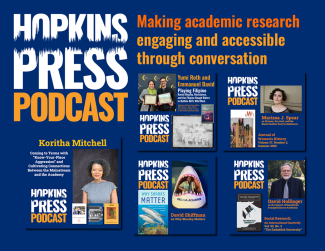
Johns Hopkins UniversityEst. 1876
America’s First Research University
Print Plus: A Blueprint for Open Access in the Humanities

![]()
The Modernism/modernity Print Plus platform, winner of the 2019 Prose Award for Innovations in Journal Publishing is a successful and innovative collaboration between the Modernist Studies Association and the Journals division of the Johns Hopkins University Press that, since its launch in January 2016, has advanced the concept of the digital “commons” to become a kind of virtual meeting space for the modernist community. The platform’s intellectual foundation is the JHUP-published journal Modernism/modernity, but Print Plus enhances the print journal by leveraging audio, video, and image files and utilities like the Hypothesis annotation tool that are intended to build added layers of context and interpretation into the content. Modernism/modernity editor Debra Rae Cohen of the University of South Carolina and Matt Huculak, Digital Scholarship Librarian at University of Victoria and current Project Muse Advisory Board member, were the platform’s content architects and JHUP is the ideal development partner because of our relationship with the Modernist Studies Association and our tradition of excellence in digital publishing, as evidenced by Project MUSE.
One of our guiding principles was that Print Plus be developed and viewed first and foremost as a scholarly resource and not simply a modernist studies-related website. Print Plus content is released in cycles rather than issues. Types of content that are published on the platform include article, media, and forum sections. All articles are peer-reviewed and include both essays republished from the traditional journal and others that are exclusive to Print Plus. The Forums include articles that are grouped into distinct topic clusters, blogs, and discussions. Print Plus and the print journal have a common editorial structure, though the platform has a distinct managing editor who provides content management and is our technical contact. All articles are assigned DOI’S and Print Plus is indexed in the MLA Bibliography.

Print Plus was conceived and developed as a completely OA platform. Openness and accessibility were the top requirements and priorities. As Matt Huculak wrote in his original concept paper, Print Plus was envisioned as a resource
that encourages community-generated content; one that enables sharing in a variety of social networks; one that enables members of the community to communicate with one another; one that stores and preserves the data produced by the community according to widely adopted standards (see metadata).
Print Plus is OA in the humanities done right. It has grown from an experiment to an OA resource that is sustainable because it has a solid financial foundation with the subscription journal and the commitments of the Press and the MSA. The Press and the MSA realized that there would be significant costs associated with Print Plus and understood that a hybrid approach that accepted varying financial models as necessary and appropriate was a formula for encouraging OA in the humanities. Print Plus is a wonderful example of a project in the digital humanities that is making an impact and provides a blueprint for how future collaborations between publishers, scholarly associations, and scholars can be built.
Bill Breichner is the Journals Publisher at Johns Hopkins University Press.


